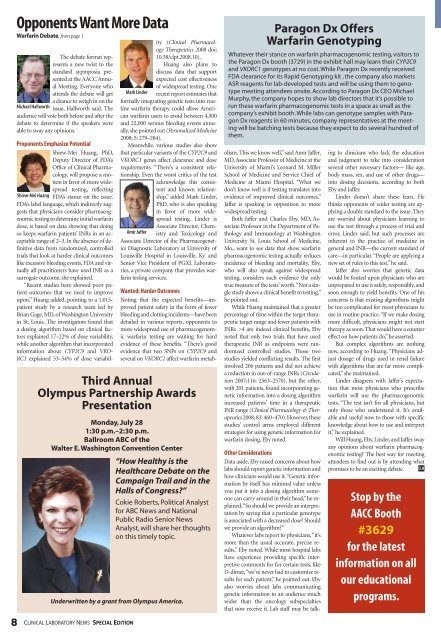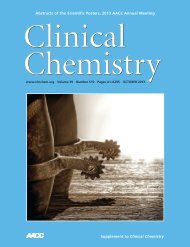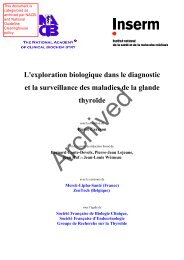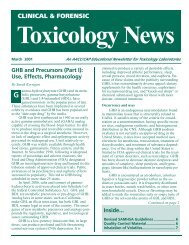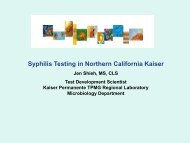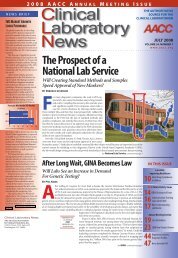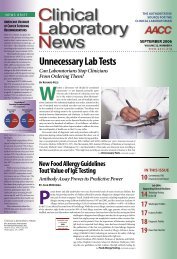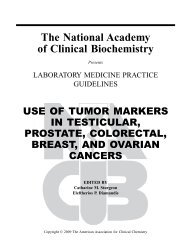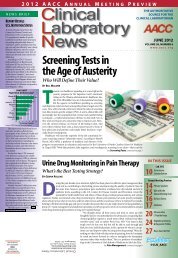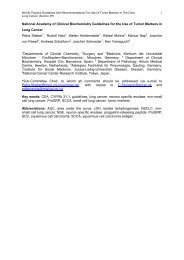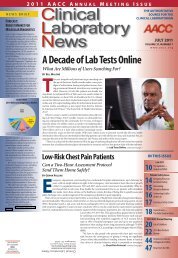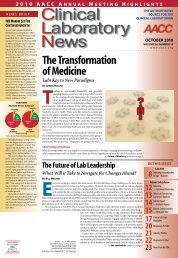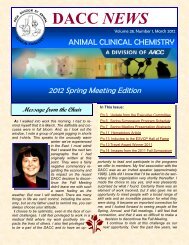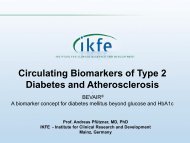Download the Monday Daily - American Association for Clinical ...
Download the Monday Daily - American Association for Clinical ...
Download the Monday Daily - American Association for Clinical ...
Create successful ePaper yourself
Turn your PDF publications into a flip-book with our unique Google optimized e-Paper software.
Opponents Want More Data<br />
Warfarin debate, from page 1<br />
The debate <strong>for</strong>mat represents<br />
a new twist to <strong>the</strong><br />
standard sypmposia presented<br />
at <strong>the</strong> AACC Annual<br />
Meeting. Everyone who<br />
attends <strong>the</strong> debate will get<br />
a chance to weigh in on <strong>the</strong><br />
michael Hallworth issue, Hallworth said. The<br />
audience will vote both be<strong>for</strong>e and after <strong>the</strong><br />
debate to determine if <strong>the</strong> speakers were<br />
able to sway any opinions.<br />
Proponents Emphasize Potential<br />
Shiew-Mei Huang, PhD,<br />
Deputy Director of FDA’s<br />
Office of <strong>Clinical</strong> Pharmacology,<br />
will propose a motion<br />
in favor of more wide-<br />
shiew-mei Huang<br />
spread testing, reflecting<br />
FDA’s stance on <strong>the</strong> issue.<br />
FDA’s label language, which indirectly suggests<br />
that physicians consider pharmacogenomic<br />
testing to determine initial warfarin<br />
dose, is based on data showing that doing<br />
so keeps warfarin patients’ INRs in an acceptable<br />
range of 2–3. In <strong>the</strong> absence of definitive<br />
data from randomized, controlled<br />
trials that look at harder clinical outcomes<br />
like excessive bleeding events, FDA and virtually<br />
all practitioners have used INR as a<br />
surrogate outcome, she explained.<br />
“Recent studies have showed poor patient<br />
outcomes that we need to improve<br />
upon,” Huang added, pointing to a 1,015patient<br />
study by a research team led by<br />
Brian Gage, MD, of Washington University<br />
in St. Louis. The investigators found that<br />
a dosing algorithm based on clinical factors<br />
explained 17–22% of dose variability,<br />
while ano<strong>the</strong>r algorithm that incorporated<br />
in<strong>for</strong>mation about CYP2C9 and VKO-<br />
RC1 explained 53–54% of dose variabil-<br />
8 CliniCal laboratory news speCiaL eDiTion<br />
mark linder<br />
ity (<strong>Clinical</strong> Pharmacology<br />
Therapeutics 2008 doi:<br />
10.38/clpt.2008.10).<br />
Huang also plans to<br />
discuss data that support<br />
expected cost effectiveness<br />
of widespread testing. One<br />
recent report estimates that<br />
<strong>for</strong>mally integrating genetic tests into routine<br />
warfarin <strong>the</strong>rapy could allow <strong>American</strong><br />
warfarin users to avoid between 4,500<br />
and 22,000 serious bleeding events annually,<br />
she pointed out (Personalized Medicine<br />
2008; 5: 279–284).<br />
Meanwhile, various studies also show<br />
that particular variants of <strong>the</strong> CYP2C9 and<br />
VKORC1 genes affect clearance and dose<br />
requirements. “There’s a consistent relationship.<br />
Even <strong>the</strong> worst critics of <strong>the</strong> test<br />
acknowledge this consistent<br />
and known relationship,”<br />
added Mark Linder,<br />
PhD, who is also speaking<br />
in favor of more widespread<br />
testing. Linder is<br />
Amir Jaffer<br />
Associate Director, Chemistry<br />
and Toxicology and<br />
Associate Director of <strong>the</strong> Pharmacogenetics<br />
Diagnostic Laboratory at University of<br />
Louisville Hospital in Louisville, Ky. and<br />
Senior Vice President of PGXL Laboratories,<br />
a private company that provides warfarin<br />
testing services.<br />
Wanted: Harder Outcomes<br />
Noting that <strong>the</strong> expected benefits—improved<br />
patient safety in <strong>the</strong> <strong>for</strong>m of fewer<br />
bleeding and clotting incidents—have been<br />
detailed in various reports, opponents to<br />
more widespread use of pharmacogenomic<br />
warfarin testing are waiting <strong>for</strong> hard<br />
evidence of <strong>the</strong>se benefits. “There’s good<br />
evidence that two SNPs on CYP2C9 and<br />
several on VKORC1 affect warfarin metab-<br />
Third annual<br />
olympus partnership awards<br />
presentation<br />
<strong>Monday</strong>, july 28<br />
1:30 p.m.–2:30 p.m.<br />
ballroom abc of <strong>the</strong><br />
Walter e. Washington convention center<br />
“How Healthy is <strong>the</strong><br />
Healthcare Debate on <strong>the</strong><br />
Campaign Trail and in <strong>the</strong><br />
Halls of Congress?”<br />
Cokie Roberts, Political Analyst<br />
<strong>for</strong> ABC News and National<br />
Public Radio Senior News<br />
Analyst, will share her thoughts<br />
on this timely topic.<br />
Underwritten by a grant from Olympus America.<br />
paragon dx offers<br />
Warfarin Genotyping<br />
Whatever <strong>the</strong>ir stance on warfarin pharmacogenomic testing, visitors to<br />
<strong>the</strong> Paragon Dx booth (3729) in <strong>the</strong> exhibit hall may learn <strong>the</strong>ir CYP2C9<br />
and VKORC1 genotypes at no cost. While Paragon Dx recently received<br />
FDA clearance <strong>for</strong> its Rapid Genotyping kit , <strong>the</strong> company also markets<br />
ASR reagents <strong>for</strong> lab-developed tests and will be using <strong>the</strong>m to genotype<br />
meeting attendees onsite. According to Paragon Dx CEO Michael<br />
Murphy, <strong>the</strong> company hopes to show lab directors that it’s possible to<br />
run <strong>the</strong>se warfarin pharmacogenomic tests in a space as small as <strong>the</strong><br />
company’s exhibit booth. While labs can genotype samples with Paragon<br />
Dx reagents in 60 minutes, company representatives at <strong>the</strong> meeting<br />
will be batching tests because <strong>the</strong>y expect to do several hundred of<br />
<strong>the</strong>m.<br />
olism. This we know well,” said Amir Jaffer,<br />
MD, Associate Professor of Medicine at <strong>the</strong><br />
University of Miami’s Leonard M. Miller<br />
School of Medicine and Service Chief of<br />
Medicine at Miami Hospital. “What we<br />
don’t know well is if testing translates into<br />
evidence of improved clinical outcomes.”<br />
Jaffer is speaking in opposition to more<br />
widespread testing.<br />
Both Jaffer and Charles Eby, MD, Associate<br />
Professor in <strong>the</strong> Department of Pathology<br />
and Immunology at Washington<br />
University St. Louis School of Medicine,<br />
Mo., want to see data that show warfarin<br />
pharmacogenomic testing actually reduces<br />
incidence of bleeding and mortality. Eby,<br />
who will also speak against widespread<br />
testing, considers such evidence <strong>the</strong> only<br />
true measure of <strong>the</strong> tests’ worth. “Not a single<br />
study shows a clinical benefit to testing,”<br />
he pointed out.<br />
While Huang maintained that a greater<br />
percentage of time within <strong>the</strong> target <strong>the</strong>rapeutic<br />
target range and fewer patients with<br />
INRs >4 are indeed clinical benefits, Eby<br />
noted that only two trials that have used<br />
<strong>the</strong>rapeutic INR as endpoints were randomized<br />
controlled studies. Those two<br />
studies yielded conflicting results. The first<br />
involved 206 patients and did not achieve<br />
a reduction in out-of-range INRs (Circulation<br />
2007;116: 2563–2570), but <strong>the</strong> o<strong>the</strong>r,<br />
with 201 patients, found incorporating genetic<br />
in<strong>for</strong>mation into a dosing algorithm<br />
increased patients’ time in a <strong>the</strong>rapeutic<br />
INR range (<strong>Clinical</strong> Pharmacology & Therapeutics<br />
2008; 83: 460–470). However, <strong>the</strong>se<br />
studies’ control arms employed different<br />
strategies <strong>for</strong> using genetic in<strong>for</strong>mation <strong>for</strong><br />
warfarin dosing, Eby noted.<br />
O<strong>the</strong>r Considerations<br />
Data aside, Eby raised concerns about how<br />
labs should report genetic in<strong>for</strong>mation and<br />
how clinicians would use it. “Genetic in<strong>for</strong>mation<br />
by itself has minimal value unless<br />
you put it into a dosing algorithm someone<br />
can carry around in <strong>the</strong>ir head,” he explained,<br />
“So should we provide an interpretation<br />
by saying that a particular genotype<br />
is associated with a decreased dose? Should<br />
we provide an algorithm?”<br />
Whatever labs report to physicians, “it’s<br />
more than <strong>the</strong> usual accurate, precise results,”<br />
Eby noted. While most hospital labs<br />
have experience providing specific interpretive<br />
comments <strong>for</strong> <strong>for</strong> certain tests, like<br />
D-dimer, “we’ve never had to customize results<br />
<strong>for</strong> each patient,” he pointed out. Eby<br />
also worries about labs communicating<br />
genetic in<strong>for</strong>mation to an audience much<br />
wider than <strong>the</strong> oncology subspecialties<br />
that now receive it. Lab staff may be talk-<br />
ing to clinicians who lack <strong>the</strong> education<br />
and judgment to take into consideration<br />
several o<strong>the</strong>r necessary factors— like age,<br />
body mass, sex, and use of o<strong>the</strong>r drugs—<br />
into dosing decisions, according to both<br />
Eby and Jaffer.<br />
Linder doesn’t share <strong>the</strong>se fears. He<br />
thinks opponents of wider testing are applying<br />
a double standard to <strong>the</strong> issue. They<br />
are worried about physicians learning to<br />
use <strong>the</strong> test through a process of trial and<br />
error, Linder said, but such processes are<br />
inherent to <strong>the</strong> practice of medicine in<br />
general and INR—<strong>the</strong> current standard of<br />
care—in particular. “People are applying a<br />
new set of rules to this test,” he said.<br />
Jaffer also worries that genetic data<br />
would be foisted upon physicians who are<br />
unprepared to use it safely, responsibly, and<br />
soon enough to yield benefits. One of his<br />
concerns is that existing algorithms might<br />
be too complicated <strong>for</strong> most physicians to<br />
use in routine practice. “If we make dosing<br />
more difficult, physicians might not start<br />
<strong>the</strong>rapy as soon. That would have a counter<br />
effect on how patients do,” he asserted.<br />
But complex algorithms are nothing<br />
new, according to Huang. “Physicians adjust<br />
dosage of drugs used in renal failure<br />
with algorithms that are far more complicated,”<br />
she maintained.<br />
Linder disagrees with Jaffer’s expectation<br />
that most physicians who prescribe<br />
warfarin will use <strong>the</strong> pharmacogenomic<br />
tests. “The test isn’t <strong>for</strong> all physicians, but<br />
only those who understand it. It’s available<br />
and useful now to those with specific<br />
knowledge about how to use and interpret<br />
it,” he explained.<br />
Will Huang, Eby, Linder, and Jaffer sway<br />
any opinions about warfarin pharmacogenomic<br />
testing? The best way <strong>for</strong> meeting<br />
attendees to find out is by attending what<br />
promises to be an exciting debate. cln<br />
Stop by <strong>the</strong><br />
AACC Booth<br />
#3629<br />
<strong>for</strong> <strong>the</strong> latest<br />
in<strong>for</strong>mation on all<br />
our educational<br />
programs.


